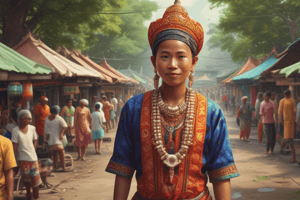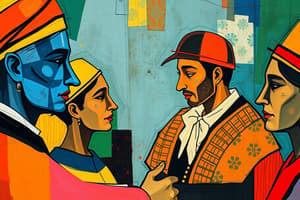Podcast
Questions and Answers
Norms act as guides, indicating what is considered proper or improper behavior. Which of the following is an example of how norms might influence individual actions?
Norms act as guides, indicating what is considered proper or improper behavior. Which of the following is an example of how norms might influence individual actions?
- A student chooses a career path solely based on personal interest, ignoring societal needs.
- A person adjusts their clothing style to fit in with a professional work environment. (correct)
- An artist creates a piece that deliberately challenges established artistic conventions.
- An individual decides to violate a law, despite knowing the potential consequences.
Norms serve various functions in society. What is the LEAST likely role that norms play?
Norms serve various functions in society. What is the LEAST likely role that norms play?
- Encouraging critical thinking and the questioning of authority. (correct)
- Providing a common framework for understanding behavior.
- Establishing standards for evaluating actions as right or wrong.
- Promoting predictability and stability in social interactions.
In society, norms indicate standards of morality, ethics, and legality. If a company decided to dispose of waste in a way that heavily polluted a local water source, which standard is being most directly violated?
In society, norms indicate standards of morality, ethics, and legality. If a company decided to dispose of waste in a way that heavily polluted a local water source, which standard is being most directly violated?
- Ethics
- Morality
- Propriety
- Legality (correct)
Norms of decency dictate appropriate behavior and presentation. Considering the norms around decency and politeness, which behavior would be the LEAST acceptable in a formal business meeting?
Norms of decency dictate appropriate behavior and presentation. Considering the norms around decency and politeness, which behavior would be the LEAST acceptable in a formal business meeting?
What differentiates norms of conventionality from norms of decency?
What differentiates norms of conventionality from norms of decency?
Conventional norms exert social control by influencing individuals to conform. What demonstrates the power of conventional norms in shaping behavior?
Conventional norms exert social control by influencing individuals to conform. What demonstrates the power of conventional norms in shaping behavior?
Deviance can be seen as an act of power struggle. In which situation is deviance most likely a form of power struggle?
Deviance can be seen as an act of power struggle. In which situation is deviance most likely a form of power struggle?
Conformity and deviance can lead to societal changes. Evaluate the following scenarios and determine which one best demonstrates how deviance can lead to positive social transformations:
Conformity and deviance can lead to societal changes. Evaluate the following scenarios and determine which one best demonstrates how deviance can lead to positive social transformations:
Consider dietary rules linked to specific life events. Why might certain foods be prohibited during religious periods, for specific life stages, or for specific groups?
Consider dietary rules linked to specific life events. Why might certain foods be prohibited during religious periods, for specific life stages, or for specific groups?
Filipino cuisine is influenced by other cultures. How does this culinary influence impact the development of food taboos?
Filipino cuisine is influenced by other cultures. How does this culinary influence impact the development of food taboos?
If a person consumed dog meat in the Philippines, what is the primary reason this would be considered a violation of food taboos?
If a person consumed dog meat in the Philippines, what is the primary reason this would be considered a violation of food taboos?
In the Philippines, what is 'Pagpag,' and why is its consumption considered a violation of societal norms?
In the Philippines, what is 'Pagpag,' and why is its consumption considered a violation of societal norms?
The term 'istambay' refers to a specific social phenomenon in the Philippines. Which statement best describes the defining characteristic of an 'istambay'?
The term 'istambay' refers to a specific social phenomenon in the Philippines. Which statement best describes the defining characteristic of an 'istambay'?
Why are political dynasties usually found in affluent families?
Why are political dynasties usually found in affluent families?
In the Philippine government structure, what is the term length for elected senators?
In the Philippine government structure, what is the term length for elected senators?
How do norms guide individual behavior?
How do norms guide individual behavior?
Why is understanding norms crucial for analyzing social, political, and cultural behavior?
Why is understanding norms crucial for analyzing social, political, and cultural behavior?
How might norms influence a person's career choice?
How might norms influence a person's career choice?
What is the role of norms in morality?
What is the role of norms in morality?
What could happen when an individual consistently defies social norms?
What could happen when an individual consistently defies social norms?
What is the difference between norms of conventionality and those of decency?
What is the difference between norms of conventionality and those of decency?
How are conventional norms related to tradition?
How are conventional norms related to tradition?
Why do conventional norms exert more sanctions, such as public approval and recognition?
Why do conventional norms exert more sanctions, such as public approval and recognition?
In what fundamental way does formal differ from informal deviance?
In what fundamental way does formal differ from informal deviance?
What could deviance be a sign of?
What could deviance be a sign of?
What is a food taboo?
What is a food taboo?
What effect do dietary rules have on social connections?
What effect do dietary rules have on social connections?
How has Filipino cuisine influenced food taboos in the Philippines?
How has Filipino cuisine influenced food taboos in the Philippines?
What does Republic Act No. 8485 prohibit in the Philippines?
What does Republic Act No. 8485 prohibit in the Philippines?
What is 'double-dead meat (botcha)'?
What is 'double-dead meat (botcha)'?
What does it mean to be an 'istambay' in the Philippines?
What does it mean to be an 'istambay' in the Philippines?
Select the phrase that best describes why political dynasties are active in socio-economic ventures.
Select the phrase that best describes why political dynasties are active in socio-economic ventures.
How often are local government officials (such as governors, mayors, and councilors) elected in the Philippines?
How often are local government officials (such as governors, mayors, and councilors) elected in the Philippines?
What sets norms of conventionality and decency apart?
What sets norms of conventionality and decency apart?
How does conformity impact society?
How does conformity impact society?
What role can deviance play in society?
What role can deviance play in society?
What distinguishes legal taboos from the personal food choices?
What distinguishes legal taboos from the personal food choices?
Flashcards
What are Norms?
What are Norms?
Societal rules or guidelines that dictate what is considered proper or improper behavior.
Norm of Decency
Norm of Decency
Standards related to clothing and polite language that demonstrate courtesy.
Conventionality Norms
Conventionality Norms
Beliefs acceptable in some cultures, but not in others; unique ethnic practices.
Conformity
Conformity
Signup and view all the flashcards
Deviance
Deviance
Signup and view all the flashcards
Food Taboos
Food Taboos
Signup and view all the flashcards
Istambay
Istambay
Signup and view all the flashcards
Political Dynasty
Political Dynasty
Signup and view all the flashcards
Philippine Elections
Philippine Elections
Signup and view all the flashcards
Study Notes
- Lesson 3 discusses social, political, and cultural behavior and phenomena.
- Objectives include recognizing how norms, taboos, and phenomena shape society, culture, and politics and analyzing the impact of societal norms and deviance on social and political structures.
Norms
- Every society maintains its own norms.
- Norms serve as guides or models, indicating propriety, appropriateness, and ethical behavior.
- They establish boundaries within which individuals can pursue their objectives.
- Often exist as rules, standards, or prescriptions that are strictly adhered to.
- They represent a society’s standards of propriety, morality, ethics, and legality.
Norms of Decency
- Norms of Decency is the type of clothing a person wears in a specific occasion.
- The use of appropriate words and gestures that convey politeness and courtesy are norms of decency.
Norms of Conventionality
- Are beliefs and practices accepted by some cultures but may be inimical to others.
- Ethnic groups often adhere to norms and practices unique to their culture.
Conformity
- Defined as the internalization of norms as a component of social expectation.
- Conventional norms carry sanctions in society, tantamount to public approval and recognition.
Deviance
- Divided into formal and informal types.
- Formal deviance involves actions that contravene enacted laws.
- Informal deviance involves violations of social norms not codified into law.
- It is sometimes considered an expression of power struggle.
- Behaviors that conform to or deviate from norms contribute to changes in various aspects of society.
Common Phenomena
- Food Taboos
- Istambay
- Political Dynasty
- Philippine Elections
Food Taboos
- Food taboos are cultural prohibitions against consuming certain foods, and is recognized across societies, often stemming from religious beliefs.
- These taboos can be manifestations of deviancy.
- Food taboos are more cultural than religious.
Eating Habits & Influences
- Food habits and dietary rules may be linked to life events like childbirth, pregnancy, menstruation, and breastfeeding.
- Dietary rules may stem from health or religious factors, with foods restricted during certain periods or for specific groups.
- Filipino cuisine is influenced by Malay, Spanish, Arab, Indian, Japanese, Chinese, and American foods.
- Filipinos eat "merienda" as their afternoon snack.
- Cooking techniques include frying, grilling, sautéing, and boiling.
Food Taboos in the Philippines
- The consumption of dog or cat meat is illegal under Republic Act No. 8485, this reflects the societal view of dogs as companions.
- Eating endangered species like monkeys, tortoises, monitor lizards, and rare birds is illegal and socially unacceptable.
- Foods deemed unacceptable by public opinion, such as "double-dead meat" (botcha), is unfit for consumption.
- "Pagpag" refers to leftover chicken or pork salvaged from restaurants and repurposed.
Istambay
- The "Istambay" Phenomenon is a social issue with economic implications, an etymological origin from the English idiom "on standby".
- An "istambay" is defined as a person who does not have work and who usually hangs-out on street corners.
Political Dynasty
- Represents a phenomenon with socio-economic undertones, especially in the Philippines.
- Political families are also found in lower-income families but are engaged in politics over several years, typically at national level.
- Affluent families are entrenched in local politics before going national.
- Possess strong local support bases.
- Active in socio-economic ventures beyond politics.
Philippine Elections
- The president, vice president, and senators serve for a six-year term.
- Members of the House of Representatives, governors, vice-governors, members of the provincial board, mayors, vice-mayors, and city/municipal councilors serve terms of three years and are eligible for re-election.
Studying That Suits You
Use AI to generate personalized quizzes and flashcards to suit your learning preferences.




